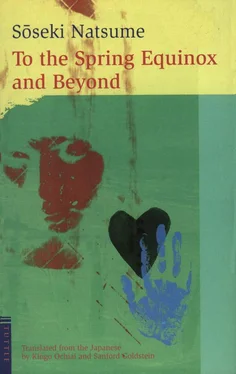As Keitaro listened silently to this criticism, he was conscious that a feeling of reliability for the man who had played this trick on him was definitely gaining the upper hand in his mind; it was by now much stronger than the regret he felt in looking back at his own foolish behavior and stronger than his bitterness against the one responsible for making a fool of him. But again there sprang forth in Keitaro the suspicion that if Taguchi were really the kind of man he now felt him to be, why was it that while he was speaking with him, he experienced that enormous feeling of constraint?
"What you've told me about Mr. Taguchi has given me a better understanding of him. But when I'm with him, I somehow feel ill at ease. There's this strange sensation, like being in a kind of pain."
"Why, that's because he himself is on guard against you."

Explained thus, Taguchi's way of looking and speaking, vividly recalled by Keitaro, was now much clearer to him. But why such an old hand as Taguchi had to bother about a stripling fresh from school, Keitaro found quite inexplicable. He firmly believed that he would pass before anyone's eyes just as he actually was, and as such he had thought so little of himself that he had not even felt a claim to be kept at a distance or to be bothered about. So he began thinking that it was rather strange to have been treated so differently from the way he had expected by a man so much older than he was, one far exceeding him in experience.
"Do I look like such a two-faced person?"
"Well, you can never tell that kind of subtlety at first glance. But whether you are or not, you don't have to worry about it. It has nothing to do with my treatment of you."
"But I have to if Mr. Taguchi looks at me that way."
"It's not you alone he regards in this way. It's the way he is — he looks at everybody like that. He's been an employer for a long time, so he must have many cases of deception. Even if a man pure as nature happened to turn up, Taguchi could not be relaxed with him. You should take it as the fate of such men. While it may sound improper to praise one's relative, I can honestly say that my brother-in-law was born with some good qualities. He's basically not a bad fellow at all. Only for years he's been battling his way through the world, thinking only of success in business as his main object in life. So he has an odd bias in his view of man. He cares only whether someone will be useful or reliable on a job, I guess. Once you get that way, even if you're loved by a woman, you can't help doubting whether she really loves you or your money. And if a beautiful woman is in for that kind of treatment, a man ought to take it for granted that he's going to be treated with constraint. That's what makes Taguchi Taguchi."
This comment seemed to give Keitaro an even greater understanding of Taguchi's character. But what sort of person was Matsumoto himself? —tossing off such judgments one after another, each of which struck into Keitaro's head as though it were being driven by an iron hammer. As far as this aspect of Matsumoto was concerned, Keitaro still felt as if he were confronting a vast mass of cloud. And he felt that even the Taguchi that existed before Matsumoto's elucidation was more of a human being.
As Keitaro observed this Matsumoto, who the other night had been saying something about a coral with Taguchi's daughter at a restaurant in Kanda, he thought that the earlier Matsumoto had moved with much more life in him. The man sitting before him now merely gave him the impression of a wooden statue with a large pipe in its mouth, a statue endowed with spirit and speech, and as such it baffled his attempt to get an image of his real substance. Filled with admiration for Matsumoto's lucid criticism on the one hand and thinking on the other about his personality, Keitaro began having doubts about himself, that his intelligence was below average and his intuition dull, when the vague Matsumoto spoke up again.
"And yet Taguchi's folly is after all bringing you luck, isn't it?"
"How could that be?"
"I'm certain he'll get you a position. If he doesn't, he's neither Taguchi nor anyone else. I'll vouch for that. I'm the one who's the loser, having been spied on and receiving nothing in return."
They looked at each other and laughed. When Keitaro rose from his circular calico cushion, his host took the trouble to accompany him to the front door. His tall thin body paused before the screen depicting the crane drawn in India ink, and he looked down at Keitaro from behind as he was putting on his shoes.
"That's a queer-looking cane. Let me see it," he said, taking it from Keitaro's hand. "My, a snake's head. And very well carved. Did you buy it?" he asked.
"No, it was done by an amateur who gave it to me."
Flourishing his walking stick, Keitaro again went down Yarai Slope toward Edogawa.


 A Rainy Day
A Rainy Day
A long period of time passed without Keitaro's receiving an opportunity to learn from Matsumoto himself the reason for his refusal to see visitors on rainy days. It had even slipped from his own mind, much too busy as he was to concern himself with it. Only after he had gained a position through Taguchi's assistance, which led to free access to the Taguchi household, did he by chance hear about it.
By that time his experience at the streetcar stop had begun to lose the freshness it once had. When Sunaga occasionally brought up the subject, all Keitaro could do was shrug off the entire incident with a smile. Sunaga would demand why Keitaro had not taken him into his confidence before he had even attempted the scheme. And he would also chide him that since his mother had informed Keitaro about his Uchisaiwaicho uncle's habit of tricking others, he certainly ought to have known about it. And finally Sunaga began badgering Keitaro for having too much interest in women. Keitaro braved it out by telling Sunaga to keep quiet, but each time there came to his mind the image of the woman he had seen from behind at Sunaga's gate, the woman who he had realized was the same one he had seen at the streetcar stop. And in some remote way he felt ashamed. That her name was Chiyoko and that her younger sister was called Momoyoko were items of information that no longer held any novelty for him.
After learning all the inside information through Matsumoto at their first encounter, Keitaro had felt embarrassed about putting in an appearance at Taguchi's, but because the conclusion of some business demanded his presence, he had passed through Taguchi's gate prepared to be laughed at, and Taguchi, as Keitaro had expected, did just that. However, Keitaro interpreted in Taguchi's laugh not so much the sound of haughty pride in his resourcefulness as that of triumphant joy in having put on the right path a man who had gone astray. Taguchi did not use any condescending words and thus imply the trick had been done for admonition's sake or as a means of education. Instead, he asked only that Keitaro not be angry because no harm had been intended and immediately gave an on-the-spot promise that he would have a considerable position available for the young man. Taguchi then clapped his hands to summon his older daughter, the one who had been waiting at the stop for Matsumoto. He formally introduced her to Keitaro, thus confirming her as his daughter. He also told her that Keitaro was a friend of Ichizo's. She gave a cold though polite greeting, apparently a little confused at being introduced to a stranger. It was then that Keitaro had learned her name was Chiyoko.
Читать дальше




 A Rainy Day
A Rainy Day










